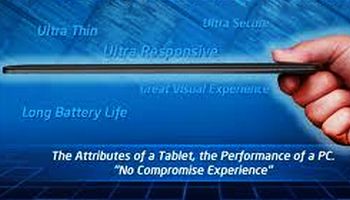

The issue of pricing for Intel’s ultrabook concept is once again coming to the forefront, with executives from Acer and Compal Electronics reportedly trying to push the chip maker to reduce the cost of some of its chips.
In a report by Taiwanese news site DigiTimes, the two executives say that without a move by Intel to cut the prices of the chips used in the ultralight and ultrathin laptops, OEMs and original design manufacturers (ODMs) will be unable to get below the $1,000 (£636) price target set by Intel, or they will have to use lower-end alternatives, which could hurt performance.
Acer Taiwan president Scott Lin said that without help on pricing from Intel, vendors will be less willing to push ultrabooks, according to the report.
Compal president Ray Chen said Intel is in danger of missing its projection that, by the end of 2012, 40 percent of notebooks sold will be ultrabooks. In addition, Chen said Intel risks losing traction in the notebook space if ultrabooks sales stagnate while Apple’s MacBook Air continues to win customers.
The lowest price on a MacBook Air is just under $1,000, while initial ultrabooks – due out this fall from the likes of Asus, Acer, Lenovo and Toshiba – are initially priced at more than $1,000.
Intel executives first introduced the ultrabook concept in May at the Computex show. According to the chip maker, ultrabooks need to come in at less than 0.8 inches thick, run an Intel processor and be priced at less than $1,000. They will offer tablet-like features, including instant-on capabilities, long battery life and a constant Internet connection – while also offering the benefits of traditional notebooks.
At the Intel Developer Forum (IDF) event this month, Intel executives made the ultrabook a key topic, calling it the natural next step in the PC space. Analysts said ultrabooks not only represent a way for Intel to get into the mobile computing space dominated by devices such as smartphones and tablets running chips designed by ARM Holdings, but they also will enable Intel to jump-start a slowing PC market hampered by, among other things, the rise of tablets.
“So far … the response from the market [to ultrabooks] has been phenomenal,” Mooly Eden, vice president and general manager of Intel’s PC Client Group, said at the show. “It’s an evolution we want to drive. A lot of innovation is needed, but I think it is inevitable.”
Since Intel first announced the concept, pricing has been raised several times as an issue, with analysts and vendors questioning whether prices could be driven down enough to hit the under-$1,000 mark. Intel over the past few months reportedly has been trying to help vendors adopt the ultrabook idea through such steps as financial incentives to OEMs, a $300 million (£192m) fund for hardware and software developers building solutions for ultrabooks, and reference architectures to help OEMs and ODMs bring down the costs.
But OEMs and ODMs apparently are going to continue pressing Intel to drop its chip prices. The DigiTimes report said “sources from PC players” noted that the CPU and operating system account for the high proportion of the ultrabook’s cost, following by ultrathin components like the panel and solid-state drives.
Intel officials have said the systems coming out this year will be the first wave of ultrabooks and will be based on the company’s 2nd Generation Core “SandyBridge” chips. Next year, more ultrabooks will roll out running on Intel’s “IvyBridge” chips, followed in 2013 by systems powered by “Haswell” processors, with each platform offering greater performance and energy efficiency.
However, analysts have said that pricing will play a key role in determining the success of ultrabooks. Charles King, principal analyst with Pund-IT Research, said during IDF that the ultrabook strategy makes a lot of sense, particularly given the “significant shift in user behaviour toward mobile computing”. Intel cannot ignore the trend, but also needs to be aware of price.
“Pricing pressures will continue to be an issue, not just for Intel but also for their vendor partners,” King said. “One effect of the iPad has been to demonstrate to consumers that $500 (£320) can buy them something pretty cool – a point reflected in the inability of competitors to crack Apple’s market dominance. Beating Apple will require vendors to deliver something notably better or cheaper than the iPad. [However,] if ultrabooks are exceptionally better, they could inspire consumers to dig deeper in their pockets.”
Pioneering robotaxi service from Alphabet's Waymo to go live in Washington DC next year, as…
Dozens of Chinese firms added to US export blacklist, in order to hamper Beijing's AI…
Chinese rival BYD overtakes global revenues of Elon Musk's Tesla, as record number of Tesla…
Messaging app Signal in the headlines after a journalist was invited to a top secret…
OpenAI chief operating officer Brad Lightcap to oversee international expansion as company consolidates lead in…
Chinese researchers publish details on device that could wreak havoc on undersea communications cables in…